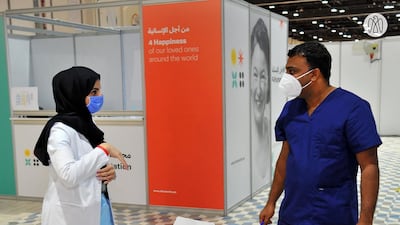Dubai's medical tourism sector is bouncing back from the effects of Covid-19, experts said.
The emirate has had a recent resurgence in numbers of visitors seeking medical treatment as restrictions on travel are gradually lifted.
With more countries than ever out of reach to medical tourists in neighbouring nations, many are looking to Dubai for the level of treatment they require.
“Dubai is quite an attractive prospect given its ease of access for those from neighbouring countries,” said Christian Schumacher, chief executive of King’s College Hospital London, Dubai.
“We are seeing an upturn in the number of visitors from countries with less developed healthcare systems, like Nigeria and others in the African continent.
“There are also a lot of visitors coming from surrounding GCC nations as well.”
The most recent figures showed there were more than 337,000 medical tourists who visited the emirate in 2018.
Last year, Dubai Health Authority said it was on track to welcome 500,000 medical tourists a year by 2021.
Although there was a slowdown in visits from medical tourists due to the coronavirus, Mr Schumacher and other health experts feel there are clear signs that the market is starting to grow again.
“There are countries that are now strictly off limits to visitors which previously had thriving medical tourism markets,” he said.
“It’s more difficult for people to travel to places like the US and to certain European cities.”

The most common reason patients are travelling to Dubai is for lifesaving procedures, Mr Schumacher said.
“We are not seeing many cosmetic procedures right now.
“People are travelling to be treated for breast cancer and we are seeing an increase in orthopaedic and cardiology patients as well.
“The reason people are travelling is the quality of care they get in Dubai. It’s safe to say they are not travelling for minor procedures.”
He was quick to allay fears that medical tourists might have about travelling outside their own countries.
“The message that is being sent is that Dubai is safe again,” Mr Schumacher said.
“The number of inquiries from medical tourists at King's College Hospital has risen to about 60 per cent of what it was in January.
“At this rate, I expect it to be back up to normal by October.”
The chief executive of Medcare said the rise in numbers was because Dubai was “getting it right”.
“There’s no point having hospitals that are among the best in the world if they do not have a welcoming environment,” Andre Daoud said.
“Dubai has got it right though because no matter where you come from, you will find a doctor who understands you.”
Mr Daoud said the emirate had benefited from the decisions made by its government.
“Everything is normalising again and we are seeing an upward trend,” he said.
“There has been a strong and positive comeback from the pandemic and I expect to see that trend continuing.
“We are going to see even more visitors from across the globe because Dubai has established itself as a hub with a commitment to safety.”
Last week, a senior figure from the DHA said Dubai was ready to reopen for medical tourists.
“As we all know, the world is currently facing an unprecedented crisis, one that has managed to impact various industry verticals, including health tourism,” said Dr Marwan Al Mulla, chief executive of the DHA’s health regulation sector.
“However, the government's commitment and effort to address the impact of the pandemic has put us on the path to recovery rather soon.
“In fact, the exemplary actions of the government has allowed the UAE to be ranked as one of the safest nations during the pandemic.”

















